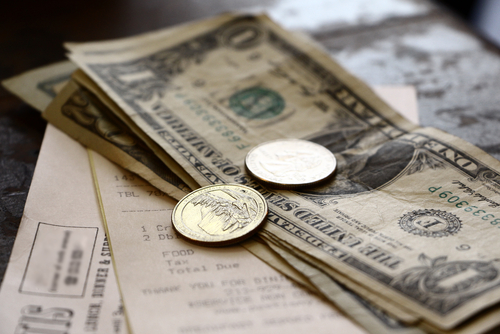How many times have you been at a restaurant and noticed the hidden fees, like tips and gratuity, tacked onto your bill? Most restaurants usually post a disclaimer at the bottom of their menus—in tiny print—or on a sign by the hostess stand, but not too many people pay attention to these things. But there may soon be something new on your bill.
 |
Recently, one restaurant in Minnesota is going to a whole new level to incorporate hidden fees into their prices— minimum wage fees. The family-owned business is now tacking on 35 cents to every bill to cover the cost of the minimum wage increase in that state.
Some customers were not happy with this charge saying the restaurant was placing the blame on the customers for the wage increase. Others claim the restaurant was blaming the government, and this was their way of sticking it to them. However, the owner fired back by saying, “Thumbing my nose at the law change, you’re right. Part of my thinking was to shine a light on this matter, which I truly believe is in the best interest of both my business and employees.”
The wage increase is expected to cost the restaurant over $10,000 during the next year, and the owner says that if Minnesota passed a tip credit like 43 other states, they wouldn’t have to charge their customers the fee. According to BLR® Legal Editor Susan Prince, “Most states allow employers to take a tip credit. In these states, although tipped employees are entitled to minimum wage, employers are allowed to pay tipped employees a cash wage of a certain dollar amount and take a tip credit up to another dollar amount —provided that the balance of the minimum wage is made up in the form of tips. Minnesota employers may not deduct tips received by an employee from the hourly minimum wage.”
Among the general uproar, Minnesota Governor Mark Dayton has also added his 2 cents saying the fee is “tacky.” Could this be a new restaurant trend or something that will receive a lot of backlash from the public? We shall see!

If Minnesota passed a tip credit, restaurants wouldn’t have to charge an additional fee, BECAUSE,
they would then be allowed to simply take an even greater amount of money from the tips customers present their employees. The tip credit is a law that allows employers to indirectly take a portion of the customer’s tip. In many cases it amounts to a lot more than 35 cents per bill.
Instead of directly taking part of the customer’s tip, the tip credit allows employers to deduct up to $5.12 each hour from the tips an employee receives so that the employer may utilize the customer’s money, instead of his own, to pay his employee minimum wage. If a workers receives exactly $5.12 an hour in tips from customers, the tip credit allows the employer to lower the employee’s hourly wages, including tips, by an amount equal to $5.12 per hour. What this means is that the tips customers are presenting this employee will only benefit the employer who is using the money to pay his minimum wage obligations. The tip credit allows employers to use the tips customers present to benefit themselves without any consent, what-so-ever, from unsuspecting customers.